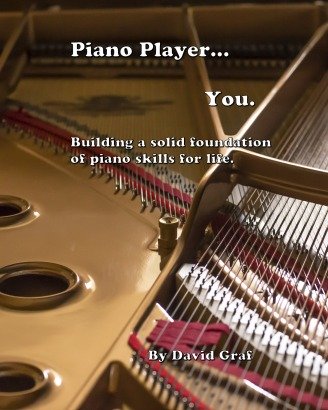The purpose of this website: helping you learn to play the piano. Building a strong foundation of piano-playing skills will lead to a lifetime of piano-playing joy.
Piano scales: the foundation of musical understanding and mastery of the instrument

Piano scales lay the foundation for a pianist’s keyboard skills and understanding of music. Mastering the music scales on the piano will not only help you know your keyboard, it will also provide you a knowledge base for learning piano music and even composing your own music.
[Many piano teachers avoid teaching the scales because they are concerned their students will get bored. I have not found this to be true. Most piano students enjoy playing the scales and chords and related exercises. For the practicing piano player, the scales keep the fingers and the mind on the keys. As you learn and master the 12 major scales, and the 36 minor scales (natural minors, melodic minors, harmonic minors -3x12-) you will find pleasure in playing them all, or just focusing on one or two and doing "in depth" exercises. A piano player could easily spend several hours just exploring the possibilities with the scales. Piano scales help the pianist develop fingering awareness, keyboard familiarity and confidence, technique, understanding of music composition including melodic concepts and harmony, and just an overall comfort and mastery of the piano. This all has a huge effect upon the piano player's abilities to read music, to learn and memorize music, and to compose music. Without a high level of scale proficiency, you will struggle to achieve high level piano skills.]
The following pages offer a resource for pianists of all levels. Fingerings and practicing tips are for everyone. (For an in depth practice plan for scales, go to "How To Practice Piano" .)
A beginner should go through, learning and mastering these elements in the order presented here.
For a more complete understanding of how to build your piano-playing foundation, read
For the most direct, organized, and progressive path to learning to play the piano, start
the Piano Skills Foundation series of piano lessons.
(Advertisement)
Piano Scales:
The Major Scales
Learn and master the major scales and their fingerings on the piano.
Major Scales I (C major & the flat keys):
Major Scales II (the sharp-keys):
The Minor Scales
Learn and master the minor scales and their fingerings on the piano.
The A Minor Scales
The B-flat Minor Scales
The B Minor Scales
The C Minor Scales
The C-sharp Minor Scales
The D Minor Scales
The E-flat Minor Scales
The D-sharp Minor Scales
The E Minor Scales
The F Minor Scales
The F-sharp Minor Scales
The G Minor Scales
The G-sharp Minor Scales
Octave Scales
You will also want to incorporate octave scales into your practice routine.
-click here to learn about octave scales-
Related Topics:
Piano Chords
Learn the chords on the piano from the most basic to the more complex.
Also explore arpeggios, inversions, voicings, cadences, and
progressions.
Key Signatures
A simple chart of the key signatures for reference and/or memorization.
Piano Exercises
From basic exercises for beginners to advanced exercises, this page
offers some advice and resources for developing your technique using the
incredible array of exercises available to pianists. Take careful note
of the practice tips.
Reading Music
Mastering the scales will greatly enhance your music reading at the
piano. If you have not started developing your music reading skills,
get started now using this plan.
-click here for more about scales-

If you want to see a blueprint for a successful piano journey...
read
"Piano Player... You"
A guide to building a solid and complete piano-playing foundation.
-Click here to learn more about this e-book-
If you would like a step-by-step guide to help you on your piano journey...
start working through
"The Piano Skills Foundation" piano lessons
-Click here to learn more about this piano course-
go from "Piano Scales" to "Free Piano Lessons"
Looking for some piano music?
I have found Sheet Music Plus to be a fantastic resource for piano books & other materials. And they have instant digital downloads for thousands of individual pieces.
3 Ways To Support This Website
If you enjoy using true-piano-lessons.com and would like to help support it:
1. Buy the ebook, "Piano Player... You"
2. Purchase "Piano Skills Foundation"
3.Donation
